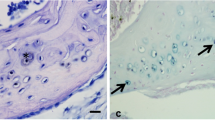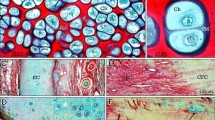Abstract
IN a previous communication1, a method was described for staining the sites of the initiation of calcification in bone and teeth. This method consisted in treating the tissues with hot pyridine for 24 hr. prior to decalcification and then staining with sudan black. Sudan black stained the matrix around the hypertrophic cells in the epiphyseal cartilage just before these cells are removed by capillary erosion.
This is a preview of subscription content, access via your institution
Access options
Subscribe to this journal
Receive 51 print issues and online access
$199.00 per year
only $3.90 per issue
Buy this article
- Purchase on Springer Link
- Instant access to full article PDF
Prices may be subject to local taxes which are calculated during checkout
Similar content being viewed by others
References
Irving, J. T., Nature, 181, 704 (1958).
Steenbock, H., and Black, A., J. Biol. Chem., 64, 263 (1925).
Author information
Authors and Affiliations
Rights and permissions
About this article
Cite this article
IRVING, J. Histochemical Changes in the Epiphyseal Cartilage during Rickets. Nature 183, 1734–1735 (1959). https://doi.org/10.1038/1831734a0
Issue Date:
DOI: https://doi.org/10.1038/1831734a0
Comments
By submitting a comment you agree to abide by our Terms and Community Guidelines. If you find something abusive or that does not comply with our terms or guidelines please flag it as inappropriate.



